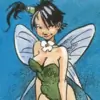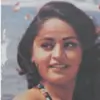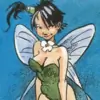What Makes Shah Rukh Khan A Superstar
On his 55th birthday, we look at how King Khan romanced audiences for over three decades, and why they’re still smitten by his charm.
IMAAN SHEIKH
November 2, 2020
GIFT STORY FOR FREE
The star in the first TV production he signed, "Dil Dariya" (1988).
DELHI, circa 1987: Veteran producer Lekh Tandon sat in the verandah of his home one afternoon, waiting for small-screen actor Divya Seth to arrive. He was planning to cast her in his upcoming TV serial Dil Dariya, but her driver, not the actor, caught Tandon's eye. Asking Seth to call the man back in, he looked the driver up and down. In true Brown uncle fashion, he told him to cut his hair — only then would he cast him as Dil Dariya's lead.
The driver, exhibiting the sheer chutzpah he is now famous for, looked at him and said, "What if I cut my hair and you don't give me the role?" It took some convincing, but eventually, he agreed. And thus, a nobody theater kid from New Delhi became the world-famous Shah Rukh Khan.
At 22, Khan hadn't just helped his friend get to her meeting, but also driven himself closer to the gate that opened to stardom. Except perhaps the inimitable Amitabh Bachchan, Khan is the king of Bollywood, whose face is known far beyond India's borders. Even though Google's web search trends favor Salman Khan, Khan reigns as the world's highest paid Indian actor. Loved for his wit and overwhelming charm, even some of the most jaded Brown women melt when confronted with his eyes.
Forbes' list of the highest-paid actors in the world, 2017. (Forbes)
"When that beam of Shah Rukh attention is on you, you feel like you are the most important person in the world and that nothing else matters," said Anupama Chopra, founder and editor of the film journalism platform, Film Companion. She's met and interviewed Khan many times. "It's basically industrial-strength charm. There is nobody else who has it in the way that he does," she said.
"Shah Rukh" is Persian for "face (of a) king." In hindsight, it's uncanny how accurately it describes him, the man who rules Bollywood like pure royalty.
He was originally named Abdul Rashid Khan by his maternal grandmother and lived with her for the first five years of his life. When he went back to live with his parents, Meer Taj Mohammad and Lateef Fatima Khan, they changed his name to Shah Rukh Khan. His father was from a family of freedom fighters in Peshawar and moved to India in 1948, a year after the end of the British Raj. He and his brothers helped organize and energize protest rallies against the British with fiery speeches, which even led to him spending nights in jail. He ran a canteen at the reputable National School of Drama in Delhi, famed for producing some of India's best-known actors. A young Khan would go to his dad's workplace and get to see the bright stars that frequented the premises. Perhaps unbeknownst to him then, Khan would end up joining the school years later.
Shah Rukh Khan in "Fauji" (1989).
Khan's mother Lateef Fatima worked as a social worker and magistrate. She was adopted by Major-General Shahnawaz Khan, who worked in the Indian National Army of Indian nationalist leader Subhash Chandra Bose, and her wedding also took place at Shahnawaz Khan's residence. In 1981, when her husband lost his battle to cancer, she raised both Khan and his sister, Shehnaz Lalarukh, on her own.
Dil Dariya wouldn't end up being Khan's debut. His real estate agent Kamal Deewan told him that his father-in-law, big-time TV serial producer and ex-army man Colonel Raj Kumar Kapoor, was making a TV serial that paid homage to the army: Fauji. The Colonel and Tandon were friends, so when Khan auditioned, the Colonel immediately offered him a small role.
Khan had always wanted to join the army, perhaps because of the influence from his mother's side of the family. He gladly signed on, even though his scene was negligible: he would play a commando-in-training who is scolded by his Major and told to go count crows. That was it. Khan admits that he was embarrassed to tell his mother that his role was so insignificant.
But fate had other plans. Kapoor's son, originally slated to play the lead, was too busy handling the cinematography for Fauji. By this time, Kapoor had grown more fond of his crow-counting extra, and Khan's charisma coupled with a stroke of sheer luck took him from a nameless commando with seconds of screentime to Abhimanyu Rai, the lead actor.
In her book, King of Bollywood: Shah Rukh Khan and the Seductive World of Indian Cinema, Chopra noted that Khan would shoot for Fauji during the lunch breaks of Dil Dariya shoots. Due to Dil Dariya's production delays, Fauji hit the screens first. On January 19, 1989, India's government TV channel Doordarshan aired the pilot and the country was immediately enamored by a charming, fresh-faced Khan. He was cool and effortless — relaxed in his performance even as he played a role as stiff as a soldier. Right from the first episode, he stood out for his charisma, fluid dialogue delivery, and of course, good looks. There he was on Doordarshan, smoking a cigarette, having an attitude, being a hot soldier on a TV channel that also played religious epic
Rishi Kapoor and Shah Rukh Khan in "Deewana" (1992), Khan's debut film. (Bhagwan Chitra Mandir)
Unfortunately, around the same time, Khan's mother passed away after complications from diabetes. She only ever got the chance to see her son on the small screen.
Soon, renowned Bollywood actor Hema Malini saw Khan in Fauji. She was looking for a male lead for her directorial film debut Dil Aashna Hai. She, too, didn't like his unruly hair, to the point that she considered his first audition a failure (she couldn't see the expressions in his fringe-covered eyes) and had him gel his hair back for a second audition. This time, he bagged the lead role and shooting began.
Young Khan with his longtime sweetheart Gauri Chibber. (Instagram)
By this time, it was 1991, and he had moved to Mumbai and married his longtime sweetheart Gauri Chibber. They had met as teenagers at a party in 1984. Chopra's biography of Khan recounts that Chibber lived in a joint family, and Khan would call under the feminine pseudonym of "Shaheen" to avoid alerting her family. The relationship was tumultuous, with one fight leading to Chibber leaving Delhi for Mumbai, unannounced. Khan came looking for her, and when patched up, they knew this would be forever. In October of 1991, the two tied the knot. Years later, she would go on to produce some of his biggest films.
Meanwhile, filmmaker Raj Kanwar was making his directorial debut, Deewana, which involved a love triangle. He had already cast lead actor Rishi Kapoor and was looking for his second male lead. But by this time, actors such as Anil Kapoor and Govinda were already established and rejected playing second fiddle. Actor Armaan Kohli signed, but later walked offset due to creative differences. Kanwar signed Khan, and luck was on their side.
Shah Rukh Khan in "Anjaam" (1994). Credit: Shiv-Bharat Films.
Like with Dil Dariya, production delays shifted the release of Dil Aashna Hai to December 1992. Deewana managed to hit the theatres six months earlier and became the second highest-grossing Indian film of the year. It bagged six Filmfare awards, including one for "Best Debutant — Male" for Khan. Dil Aashna Hai, Khan's almost-debut, was a flop. Luck again was on his side. King Khan was different, and he was just getting started.
Film Companion Editor Anupama Chopra interviews Shah Rukh Khan. (Film Companion)
"When he came into the film industry, he would have this flopping hair, his shirt was untucked, he had no style in terms of being groomed, and that was what made him a feeling — that he didn't care," Chopra told The Juggernaut. "He didn't care to pretend to not be married, so he flaunted his wife at a time when many people advised him that he couldn't be a big hero if you're already married because it somehow affected your desirability quotient. But he didn't care about that."
In 1992, Khan had four film releases, and between 1993 and 1994, seven. Khan proved his versatility as an actor, playing the villain in three films in 1993 — Anjaam, Darr, and Baazigar. All three roles had been rejected by other actors.When Anil Kapoor rejected Anjaam; Khan accepted it. When actor Aamir Khan rejected Darr; once again, SRK was willing to take the role. Actors Salman Khan, Akshay Kumar, and Anil Kapoor, all three rejected Baazigar, and yet, Shah Rukh Khan had to spend time convincing the producer to cast him. Critics said he was too cute to be taken seriously as a villain, but the gamble paid off. He was paired with top actors Madhuri Dixit and Juhi Chawla. In his negative roles, you could see fury and disgust in his eyes, hear the manipulativeness in his tone, and feel the anxiety and fear his limitless obsession induced.
Khan was grabbing at anything he could. He put his standards aside and risked forever being perceived as the anti-hero by playing three villains consecutively. He was willing to take any chance he could to make an impression, and it paid off. Audiences loved him as a creepy sociopath, the stalker, the killer, but they still swooned when he played the romantic, righteous hero later.
Shah Rukh Khan in "Darr" (1993). Credit: Yash Raj Films.
In Baazigar, his first solo male lead role, he wowed cinemagoers with his chemistry with newbie actor Kajol. In Maya Memsaab, a film based on French novelist Gustave Flaubert's book Madame Bovary, fans saw Khan's first (and only) sex scene. India's film censorship body, Censor Board of Film Certification (CBFC), heavily censored it. When an entertainment magazine Cine Blitz claimed that he and his co-star Deepa Sahi had had a real-life practice run for the sex scene in a suburban hotel the night before the shoot, Khan was fuming. He incessantly phoned a journalist from the publication and spat threats upon threats, due to which he ended up being arrested. In his recent appearance on David Letterman's Netflix talk show, My Next Guest Needs No Introduction, Khan said he still called the journalist after getting out on bail. "Now I'm in jail, and I'm not scared. Now you be very scared [sic]," he told him.
He never did a sex scene again.
By this time Shah Rukh Khan had become SRK, the celebrity — famous and influential enough to make a cameo appearance in 1993 thriller Pehla Nasha as himself. The reigning Khans, Salman and Aamir, would have to watch out. SRK had bagged three more Filmfare awards, but his best years were yet to come.
The year 1995 brought seven more SRK-starrers. The iconic film Dilwale Dulhania Le Jayenge (DDLJ) not only wooed Indians, but also began to pull in the previously reluctant South Asian diaspora as it combined traditional Indian values and Bollywood's signature song-and-dance with the refreshing laidback playfulness of Western informality and style. And who could do that better than Khan?
Raj, Simran, and Bauji in "DDLJ". (YRF)
"I think Shah Rukh was the first to play a bad boy in a contemporary way. And when I say 'bad boy,' it doesn't mean that he was evil or that he was doing things that were really bad, but he was doing things that were borderline wicked, like buying beer in DDLJ in that scene where he goes to [Kajol's] Bauji's store," Chopra, who has also written a book about the film, told me. "All those things [set him apart from] what the 'good' Hindi movie hero was like."
Chopra's book, Dilwale Dulhania Le Jayenge: A Modern Classic, notes that Raj, as a character was never crafted to be that of an unblemished boy. Scenes in the film hint that he's sexually experienced. "Originally, the scene in which Raj visits Baldev's store had him wanting to buy condoms," reads a paragraph in the book. "But later, [director] Aditya [Chopra] thought that condoms would be too much of a transgression." By the second half of the 1990s, SRK delivered a series of hits, consistently: Dil Se, Pardes, Kuch Kuch Hota Hai, and Dil To Pagal Hai.
Chopra recalls interviewing him in 1997-98: "He was talking about how he has only five expressions, but that's fine because his competitors only have three. Hindi film heroes of the time didn't make jokes like that. [Basically], he was cool."
She added that Khan was also desi enough in terms of values and believably respectful on screen. “He could still pull it off without any kind of falsity. He managed to combine those things — [his Westernized coolness and] this veneer of sophistication…[the kind of] guy who would be at home as much in New York as he would be in New Delhi.”
Chopra's right. He didn't just fit in at home — Indians made a god out of him. Scores of fans from all over the country had been gathering routinely outside his landmark home, named Mannat, to catch a glimpse of him, especially on his birthday (this year, he them not to do so due to the pandemic). A man in India changed his name from Vishal Singh to Vishahrukh Singh and began turning his home into a shrine for his idol. Now, his home has become a landmark museum of sorts, dedicated to the works of the Baadshah of Bollywood — a title fans and the media have used for him since the release of his film Baadshah (1999).
Outside India, he had even worked his magic on non-South Asian film fanatics. Last year, a video of his African fans singing "Kal Ho Naa Ho" went viral. In 2016, an Egyptian superfan sang "Jabra" from Fan in another viral video. An Australian fan is reported to have bought Khan several acres of land on the moon as a birthday gift (lunar property certificates included). In 2012, she claimed on Twitter that she had a star named after him, too.
"He's made films cool. He's made Bollywood cool — not just for India but for the NRI [Non-Residential Indian]market," said Vogue India Editor-in-Chief Priya Tanna in the 2010 Discovery Channel documentary Shah Rukh Khan: Revealed. Even off the big screen, Khan was oozing with personality. He was winning over fans with his quick wit and sarcastic, deadpan humor in his interviews. In many instances, the actor engages in banter with reporters and interviewers on a personal level.
Devdas, 2001. (Red Chillies Entertainment)
As he approached the big fifty, Khan slowed his roll. He did select films, but didn’t want to compromise on providing entertainment. He recently appeared on David Letterman’s show, but his allure, even when out of the limelight, refuses to dim out.
In a time of increased accountability (or what some call "cancel culture"), SRK has somehow not only survived but fared well compared to his Bollywood counterparts. He's been called out for endorsing fairness creams. But when he is criticized, it's usually for his silence rather than his words. Late last year, when students of Jamia Millia Institute faced police brutality for protesting the anti-Muslim Citizenship Amendment Act (CAA), Khan's silence, as an alumnus, was deafening.
However, in 2015, the star received a slew of backlash for calling India intolerant in an interview, after which Khan has been more reticent. Uttar Pradesh Chief Minister Yogi Adityanath compared him to Pakistani terrorist Hafiz Saeed and accused him of treason. Bharatiya Janata Party (BJP) members demanded Khan return all the honors and awards India had given him and attacked him for being a Muslim with ancestral roots in Pakistan; several BJP members and supporters have told him to go to Pakistan. Some speculated that, as a Muslim actor, Khan had to be careful for the safety of him and his family.
After all, there's more to the star than what we see on screen.
In his real life, Khan doesn't really have much of a filter either. "I think what worked and what seamlessly connected his personality with his time when India was modernizing and becoming westernized was the fact that he was modern and westernized," said Chopra. "It was his whole 'I don't give a shit' attitude. In life as well." His text messages make her laugh out loud, and his well-timed wit and dry self-deprecation are unfaltering. And he's exactly like that in life.
That makes Khan different from other actors: he is a hero on and off the screen. While most actors play roles, he lived his. Whatever character he played, whether it was the edgy Raj Malhotra in DDLJ or the understanding, soft-spoken Dr. Jehangir in Dear Zindagi (2016), he was always Shah Rukh Khan.
Imaan Sheikh is based in Toronto, used to write for BuzzFeed India, and hails from Karachi.


































9